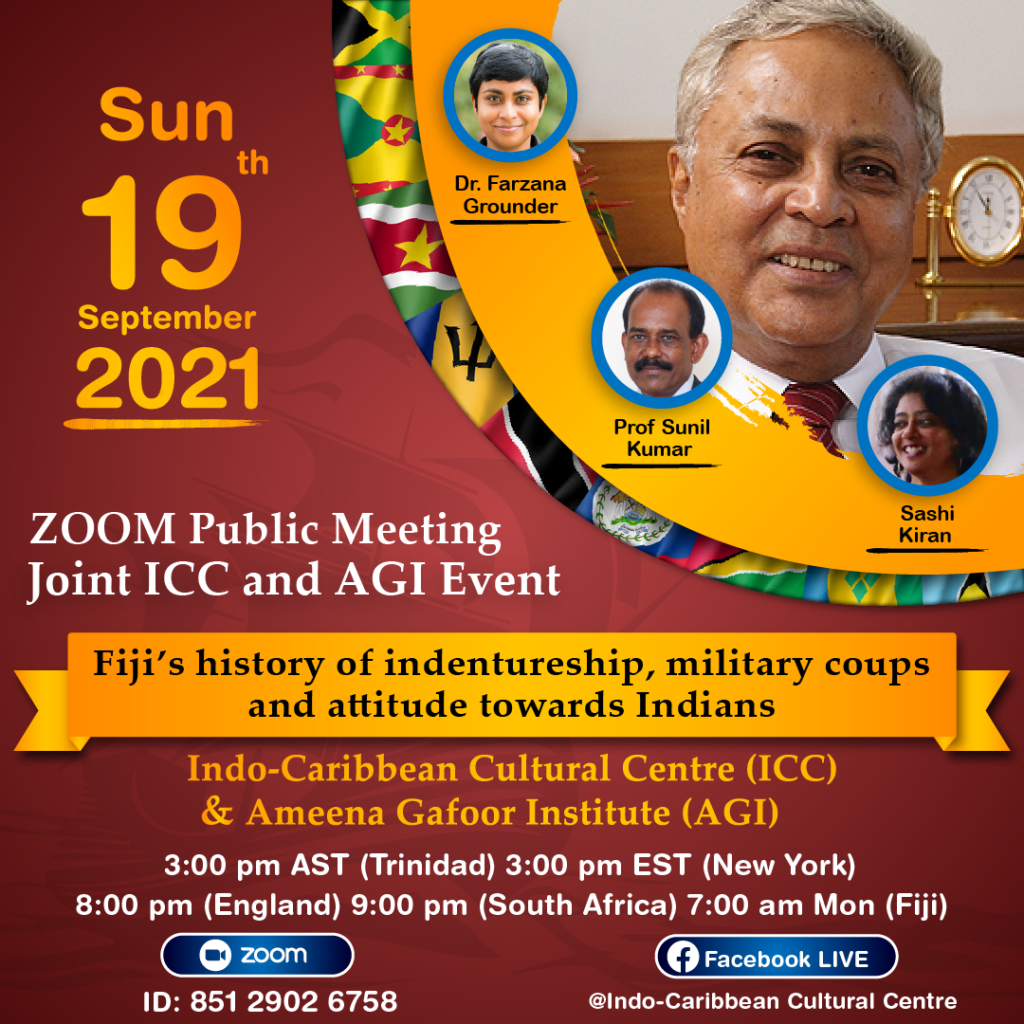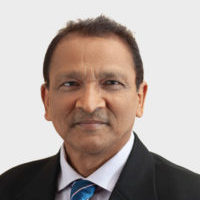INVITATION TO ZOOM PUBLIC MEETING THIS SUNDAY
 Except for Mauritius, Indians in the Diaspora live a life of insecurity and suffer for generations from institutional discrimination: South Africa and Uganda, followed by Suriname and Guyana, are examples. But Fiji is a classic case of the fate of Indians in these multi-ethnic, girmitiya societies in which they constitute a significant size of the population. The history of Fiji can well chart the future of Indians in these countries.
Except for Mauritius, Indians in the Diaspora live a life of insecurity and suffer for generations from institutional discrimination: South Africa and Uganda, followed by Suriname and Guyana, are examples. But Fiji is a classic case of the fate of Indians in these multi-ethnic, girmitiya societies in which they constitute a significant size of the population. The history of Fiji can well chart the future of Indians in these countries.
In 1879, Indians migrated to Fiji as indentured labourers, and by 1945 they outnumbered the indigenous Fijians for the first time. In the 1977 general elections, the Indian-led opposition won a majority of seats in the legislature, but failed to form a government for fear of the reaction of indigenous Fijians to an Indian leader. The island was being rocked by fire bombings of temples and mosques.
A coup in 1987 led by Lt.-Col. Sitiveni Rabuka overthrew the coalition government of Prime Minister Dr. Timoci Bavadra whose cabinet included seven Indians and five indigenous Fijians. Over 12,000 Fijians, nearly 10,000 of whom were Indian Fijians, left the country after the
coup, according to a United Nations Refugee Agency report. In 1999, Mahendra Chaudhry became the first Indo-Fijian Prime Minister amidst fears of more coups. Just as in Guyana today, there were protests against the election of an Indian-led Government in the form of violence against Indians and arson attacks on their properties.
Like all Indian Prime Ministers in the Diaspora, Chaudhry went overboard in appeasing the non-Indian Opposition forces. He was, nevertheless overthrown in 2000 in a coup that was instigated by George Speight
Please join us for a joint ICC (Indo-Caribbean Cultural Centre) & AGI (Ameena Gafoor Institute) ZOOM Public Meeting at the NOW-STANDARDIZED TIME: Sunday September 19, 2021 at (1.00 p.m. Belize), (3.00 p.m. New York/Eastern time), (3.00 p.m. Trinidad/Atlantic time), (3.00 p.m. Guyana), (4.00 p.m. Suriname), (8.00 p.m. England), (9.00 p.m. South Africa), (Mon 12.05 a.m. India, ND), (Mon 7.00 a.m. Fiji).
TOPIC: Fiji’s history of indentureship, military coups and attitude towards Indians
SPEAKERS:
- DR. FARZANA GOUNDER – Deputy Head of School (Research) at IPU New Zealand Tertiary Institute, and Adjunct Professor at the University of Fiji’s JPD Law School
- PROF. SUNIL KUMAR – Associate Professor of Economics at the University of Fiji; currently the Fiji Chapter President of World Hindu Federation
- SASHI KIRAN – Founder and CEO of Foundation for Rural Integrated Enterprises Development (FRIEND), a grassroots NGO established after the civil unrest of 2000 in Fiji
Join Zoom Meeting by touching or clicking on this link:
https://us02web.zoom.us/j/85129026758
Meeting ID: 851 2902 6758
No Passcode required
Live-streamed on the Facebook page of Indo-Caribbean Cultural Centre
https://www.facebook.com/indocaribbeanculturalcentre
Hosted by www.indocaribbeanpublications.com & https://ameenagafoorinstitute.org
WhatsApp 868 756 4961 or 868 738 4963
E-mails: dmahabir@gmail.com, indocaribbeanstaff@gmail.com

is a full-time anthropologist at the University of Guyana (UG) and Fellow of The Eccles Centre for American Studies, British Library (2022-23). He is a former Assistant Professor at the University of Trinidad and Tobago (UTT). He obtained his Ph.D. in Anthropology from the University of Florida (UF). As a doctoral student, he won a Florida Caribbean Institute Award, an A. Curtis Wilgus Grant, and an Organization of American States (OAS) Fellowship.
Mahabir received a National Award (Hummingbird Silver Medal) for his contribution to education in his country in 2011. He was among 50 recipients who received a Distinguished Alumni Award from the UWI Alumni Association.
Mahabir is the author of 12 books to date.
